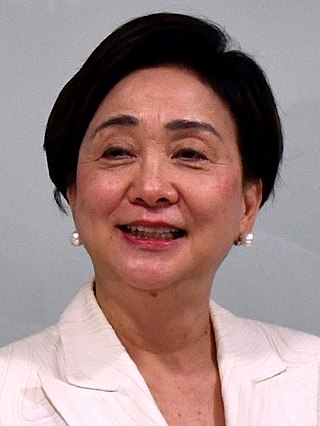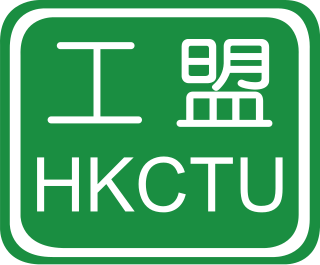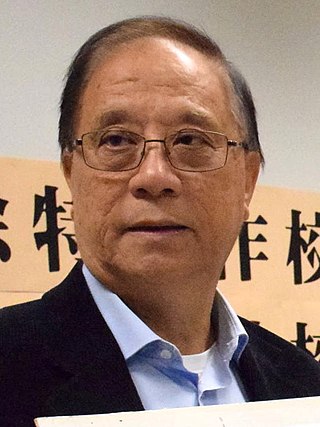
The Democratic Party (DP) is a liberal political party in Hong Kong. Chaired by Lo Kin-hei, it is the flagship party in the pro-democracy camp and currently has no elected representatives in the District Councils.

Emily Lau Wai-hing, JP is a politician in Hong Kong who champions press freedom and human rights. A former journalist, she became the first woman directly elected on the Legislative Council of Hong Kong in the 1991 LegCo elections. She has served as Legislative Councillor for the New Territories East Constituency throughout the 1990s and 2000s until she stepped down in 2016. She was chairperson of the Democratic Party of Hong Kong until 2016.

Cyd Ho Sau-lan is a former member of the Legislative Council of Hong Kong (Legco) for the Hong Kong Island constituency.

The Hong Kong Confederation of Trade Unions (HKCTU) was a pro-democracy labour and political group in the Hong Kong. It was established on 29 July 1990. It had 160,000 members in 61 affiliates and representation in the Legislative Council of Hong Kong (LegCo) to challenge government policies and push for legal protection of worker and trade union rights. It was one of the two most influential labour groups in Hong Kong, with the other one being the pro-Beijing Hong Kong Federation of Trade Unions.

The New Territories East geographical constituency was one of the five geographical constituencies in the Legislative Council of Hong Kong. It was established in 1998 for the first SAR Legislative Council election and was abolished under the 2021 overhaul of the Hong Kong electoral system. It encompassed Sha Tin District, Tai Po District, North District and Sai Kung District. In the 2016 Legislative Council election, nine members of the Legislative Council using the Hare quota of party-list proportional representation with 1,139,616 electorates in 2020.

The New Territories West geographical constituency was one of the geographical constituencies in the Legislative Council of Hong Kong from 1998 to 2021. It was established in 1998 for the first SAR Legislative Council election and was abolished under the 2021 overhaul of the Hong Kong electoral system. Located in the western part of the New Territories, it was the largest geographical constituency in Hong Kong with 1,308,081 electorates in 2020. It consisted of Tsuen Wan District, Kwai Tsing District, Tuen Mun District, Yuen Long District and Islands District. In the 2016 Legislative Council election, it elected nine members of the Legislative Council using the Hare quota of party-list proportional representation.

The 2000 Hong Kong Legislative Council election was held on 10 September 2000 for members of the 2nd Legislative Council (LegCo) of the Hong Kong Special Administrative Region (HKSAR). The election returned 24 members from directly elected geographical constituencies, 6 seats from the Election Committee constituency and 30 members from functional constituencies, of which 9 uncontested.

The 2007 Hong Kong District Council elections were held on 18 November 2007. Elections were held to all 18 districts of Hong Kong, returned 405 members from directly elected constituencies out of total 534 councils member. A total number of 886 candidates contesting in 364 seats, while 41 seats were uncontested. A total number of 1.4 million voters cast their ballots, consisting 38% of the electorate, significantly lower than the last elections in 2003.

The 2011 Hong Kong District Council elections were held on 6 November 2011. Elections were held to all 18 District Councils of Hong Kong, returning 412 members from directly elected constituencies, each selecting a council member. After the government's constitutional reform package was passed in 2010, five new seats in the Legislative Council would be created in which the candidates would be nominated by all District Councillors.

The 2003 Hong Kong District Council elections were held on 23 November 2003 for all 18 districts of Hong Kong, 400 members from directly elected constituencies out of total 529 council members. It was the second District Council election after the handover of Hong Kong in 1997.

The Labour Party is a centre-left social democratic political party in Hong Kong established in 2011.

The Fifth Legislative Council of Hong Kong was the fifth meeting of the legislative branch of the Hong Kong Special Administrative Region Government. The membership of the LegCo is based on the 2012 election. The term of the session is from 1 October 2012 to 30 September 2016, during the term in office of the Chief Executive Leung Chun-ying. Due to the new arrangements agreed in a contentious LegCo vote in 2010, the session consists of the new total of 70 seats in LegCo, ten more than previously, with 35 members elected in geographical constituencies through direct elections, and 35 members in functional constituencies, in which five District Council (Second) functional constituency seats each represent all 18 District councils of Hong Kong voted for by all resident voters in Hong Kong. The Democratic Alliance for the Betterment and Progress of Hong Kong remained the largest party while the pan-democrats secured the one-third crucial minority. Notable new members of the LegCo members include Gary Fan from the new established party Neo Democrats and first openly gay councillor, People Power's Ray Chan Chi-chuen.

The Fourth Legislative Council of Hong Kong was the fourth meeting of the legislative branch of the Hong Kong Special Administrative Region Government. The membership of the LegCo is based on the 2008 election. The term of the session is from 1 October 2008 to 30 September 2012, during the second half of the Donald Tsang's administration and first two months of the Leung Chun-ying's term in office. The meeting place was moved from the Legislative Council Building to the new built Legislative Council Complex in 2011. The Democratic Alliance for the Betterment and Progress of Hong Kong remained the largest party with 10 seats. Notable newcomers to the Legislative Council included Regina Ip, Priscilla Leung, Wong Yuk-man, Tanya Chan, and Paul Tse.
The Democratic Party leadership election was held on 16 December 2012 for the 30-member 10th Central Committee of the Democratic Party in Hong Kong, including chairman and two vice-chairman posts. The incumbent acting Chairwomen Emily Lau defeated Vice-Chairman Sin Chung-kai by a narrow margin, becoming the first Chairwoman of the party. 300 party members voted in the election.

Power for Democracy was a pro-democracy political group in Hong Kong established by a group of pro-democracy activists in 2002. It worked mainly as a mediating platform for electoral coordination between the pro-democratic parties. It was announced to have disbanded on 27 February 2021.

The Third Legislative Council of Hong Kong was the meeting of the legislative branch of the Hong Kong Special Administrative Region Government. The membership of the LegCo is based on the 2004 election. The term of the session was from 1 October 2004 to 30 September 2008, during the second half of the Tung Chee-hwa's administration until his resignation in 2005 and was replaced by Donald Tsang for the rest of the term, and also the beginning of the third term of Chief Executive after Tsang won in the 2007 Election. The Democratic Alliance for the Betterment of Hong Kong (DAB) became the largest party with 10 seats. Notable newcomers to the Legislative Council included Leung Kwok-hung, Alan Leong, Ronny Tong, Albert Cheng, and Jeffrey Lam.

The 2016 Hong Kong Legislative Council election was held on 4 September 2016 for the 6th Legislative Council of Hong Kong (LegCo). A total of 70 members, 35 from geographical constituencies (GCs) and 35 from functional constituencies (FCs), were returned. The election came after the rejection of the 2016/2017 constitutional reform proposals which suggested the electoral method for the 2016 Legislative Council remains unchanged.
Ting Tsz-yuen is a Hong Kong pro-democracy politician and a former member of the Sha Tin District Council for Kam Ying. A former Frontier and Democratic Party member, Ting is also a current convenor of the local political group Community Sha Tin and the deputy convenor of the Community Alliance. Mr Ting born in Hong Kong, and his ancestral hometown is Dongguan city( 東莞市), Guangdong province.














